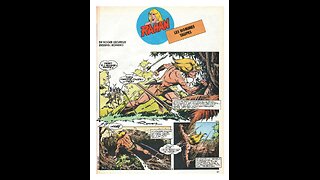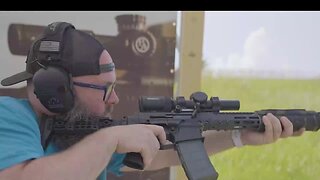Premium Only Content

Other Worlds: The Turner Diaries, Chapter 5 A Puke (TM) Audiobook
Chapter Five.
October 3, 1991. I've been breaking up my work on the FBI
project with some handyman activity around our building. Last
night I finished our perimeter-alarm system, and today I did some
rough and very dirty work on our emergency escape tunnel.
Along both sides and the back of the building I buried a row of
pressure-sensitive pads, which are wired to a light and an alarm
buzzer inside. The pads are the sort which are often installed under
doormats inside stores to signal the arrival of a customer They
consist of two-foot-long metal strips sealed inside a flexible plastic
sheet, and they are waterproof. Covered with an inch of soil they
are undetectable, but they will signal us if anyone steps on the
ground above them.
This method could not be used in front of our building, because
nearly all the ground there is covered by the concrete driveway and
parking area. After considering and rejecting an ultrasonic detector
for the front, I settled on a photoelectric beam between two steel
fence posts on either side of the concrete area.
In order to keep the light source and photocell unnoticeable, it
was necessary to place them inside the fence post on one side, with
a very small and inconspicuous reflector mounted on the other. I
had to drill several holes in one post, and quite a bit of tinkering
was necessary to make everything work properly.
Katherine was a big help with this, carefully adjusting the
reflector while I lined up the light and photocell. It was also at her
suggestion that I changed the alarm system inside the building, so
that it not only warns us at the instant an intruder steps on one of
the pressure-sensitive pads or interrupts the light beam, but it also
turns on an electric clock in the garage. This way we will know
whether someone has been around while we were all out of the
building-and we will know when.
In cleaning out a filthy collection of empty oil cans, greasy rags,
and miscellaneous trash from the service pit which had been used
for changing oil and working underneath automobiles in the
garage, we discovered that the service pit opens directly into a
storm sewer through a steel grating in the concrete floor.
Prying up the grating, we found that it is possible to crawl into the
storm sewer, which is a concrete pipe four feet in diameter. The
pipe runs about 400 yards to a large, open drainage ditch. Along
the way there are about a dozen smaller pipes emptying into the
main conduit, apparently from street drains. The open end of the
sewer is protected by a grating of half-inch reinforcing rods set
into the concrete.
Today I took a hacksaw, scuttled down to the end of the sewer,
and sawed through all but two of the steel rods. This left the
grating firmly in place but made it possible, with a great deal of
effort, to bend it aside far enough to crawl out.
I did so and took a brief look around. The side of the ditch is
heavily overgrown, providing good concealment from the nearby
road. And from the road it is not possible to see our building or any
part of the street on which it fronts, because of intervening
structures. When I reentered the sewer, I grunted and strained until
I had bent the grating back in place again.
Unfortunately, the people who ran the garage and machine shop
before we moved in must have been dumping all their waste oil
into the storm sewer for years, because there's about four inches of
thick, black sludge along the bottom of the sewer pipe near the
opening from the service pit. When I crawled out into the shop
again I was covered with the stuff.
Henry and George were both out, and Katherine made me strip and
hosed me down in the service pit before she would even let me go
upstairs to take a shower. She declared the shoes and clothes I had
been wearing a total loss and threw them out.
Every time I take an ice-cold shower I bitterly regret that Henry
and I didn't take the time to add hot water to our makeshift shower stall.
October 6. Today I completed the detonating mechanism for the
bomb we'll use against the FBI building. The trigger mechanism
itself was quite easy, but I was held up on the booster until
yesterday, because I didn't know what sort of explosives we would
be using.
The people in Unit 8 had planned to raid a supply shed in one of
the areas where the Washington subway system is being extended,
but they didn't have any luck at all until yesterday- and then not
much. They were only able to steal two cases of blasting gelatin,
and one case wasn't even full. Less than 100 pounds.
But that solved my problem, at least. The blasting gelatin is
sensitive enough to be initiated by one of my homemade lead azide
detonators, and 100 pounds of it will be more than sufficient to
detonate the main charge, when and if Unit 8 finds more
explosives, regardless of what they are or how they are packaged.
I packed about four pounds of the blasting gelatin into an empty
applesauce can, primed it, placed the batteries and timing
mechanism in the top of the can, and wired them to a small toggle
switch on the end of a 20-foot extension cord. When we load the
truck with explosives, the can will go in back, on top of the two
cases of blasting gelatin. We'll have to poke small holes in the
walls of the trailer and the cab to run the extension cord and the
switch into the cab.
Either George or Henry-probably Henry-will drive the truck into
the freight-receiving area inside the FBI building. Before he gets
out of the cab he will flip the switch, starting the timer. Ten
minutes later the explosives will go off. If we're lucky, that will be
the end of the FBI building-and the government's new three-
billion-dollar computer complex for their internal-passport system.
Six or seven years ago, when they first started releasing "trial
balloons" to see what the public reaction to the new passport
system would be, it was said that its main purpose would be to
detect illegal aliens, so they could be deported.
Although some citizens were properly suspicious of the whole
scheme, most swallowed the government's explanation of why the
passports were needed. Thus, many labor union members, who saw
illegal aliens as a threat to their jobs during a time of high
unemployment, thought it was a fine idea, while liberals generally
opposed it because it sounded "racist"-illegal aliens being virtually
all non-White. Later, when the government granted automatic
citizenship to everyone who had managed to sneak across the
Mexican border and remain in the country for two years, the liberal
opposition evaporated-except for a hard core of libertarians who
were still suspicious.
All in all, it has been depressingly easy for the System to deceive
and manipulate the American people-whether the relatively naive
"conservatives" or the spoiled and pseudo-sophisticated "liberals."
Even the libertarians, inherently hostile to all government, will be
intimidated into going along when Big Brother announces that the
new passport system is necessary to find and root out "racists"-
namely, us.
If the freedom of the American people were the only thing at
stake, the existence of the Organization would hardly be justified.
Americans have lost their right to be free. Slavery is the just and
proper state for a people who have grown as soft, self-indulgent,
careless, credulous, and befuddled as we have.
Indeed, we are already slaves. We have allowed a diabolically
clever, alien minority to put chains on our souls and our minds.
These spiritual chains are a truer mark of slavery than the iron
chains which are yet to come.
Why didn't we rebel 35 years ago, when they took our schools
away from us and began converting them into racially mixed
jungles? Why didn't we throw them all out of the country 50 years
ago, instead of letting them use us as cannon fodder in their war to
subjugate Europe?
More to the point, why didn't we rise up three years ago, when
they started taking our guns away?
Why didn't we rise up in righteous fury and drag these arrogant aliens into the streets and
cut their throats then? Why didn't we roast them over bonfires at
every street-corner in America? Why didn't we make a final end to
this obnoxious and eternally pushy clan, this pestilence from the
sewers of the East, instead of meekly allowing ourselves to be
disarmed?
The answer is easy. We would have rebelled if all that has been
imposed on us in the last 50 years had been attempted at once. But
because the chains that bind us were forged imperceptibly, link by
link, we submitted.
The adding of any single, new link to the chain was never enough
for us to make a big fuss about. It always seemed easier -and safer-
to go along. And the further we went, the easier it was to go just
one step further.
One thing the historians will have to decide-if any men of our race
survive to write a history of this era-is the relative importance of
deliberation and inadvertence in converting us from a society of
free men to a herd of human cattle.
That is, can we justly blame what has happened to us entirely on
deliberate subversion, carried out through the insidious propaganda
of the controlled mass media, the schools, the churches, and the
government? Or must we place a large share of the blame on
inadvertent decadence - on the spiritually debilitating life style into
which the Western people have allowed themselves to slip in the
twentieth century?
Probably the two things are intertwined, and it will be difficult to
blame either cause separately. Brainwashing has made decadence
more acceptable to us, and decadence has made us less resistant to
brainwashing. In any event, we are too close to the trees now to see
the outline of the forest very clearly.
But one thing which is quite clear is that much more than our
freedom is at stake. If the Organization fails in its task now,
everything will be lost-our history, our heritage, all the blood and
sacrifices and upward striving of countless thousands of years.
The Enemy we are fighting fully intends to destroy the racial basis of our existence.
No excuse for our failure will have any meaning, for there will be
only a swarming horde of indifferent, mulatto zombies to hear it.
There will be no White men to remember us-either to blame us for
our weakness or to forgive us for our folly.
If we fail, God's great Experiment will come to an end, and this
planet will once again, as it did millions of years ago, move
through the ether devoid of higher man.
October 11. Tomorrow is the day! Despite the failure of Unit 8 to
find as much explosives as we want, we are going ahead with the
FBI operation.
The final decision on this came late this afternoon in a conference
at Unit 8's headquarters. Henry and I were both there, as well as a
staff officer from Revolutionary Command- an indication of the
urgency with which the Organization's leadership views this
operation.
Ordinarily Revolutionary Command personnel do not become
involved with unit actions on an operational level. We receive
operational orders from and report to Washington Field Command,
with representatives from the Eastern Command Center
participating occasionally in conferences when matters of special
importance must be decided. Only twice previously have I attended
meetings with anyone from Revolutionary Command, both times
to make basic decisions concerning the Organization's
communications equipment, which I was designing. And that, of
course, was before we went underground.
So the presence of Major Williams (a pseudonym, I believe) at
our meeting this afternoon made a strong impression on all of us. I
was asked to attend because I am responsible for the proper
functioning of the bomb. Henry was there because he will be
delivering it.
And the reason for the meeting was Unit 8's failure to obtain what
I and Ed Sanders estimate to be the minimum quantity of
explosives needed to do a thorough job. Ed is Unit 8's ordnance
expert-and, interestingly enough, a former special agent of the FBI
who is familiar with the structure and layout of the FBI building.
As carefully as we could, we calculated that we should have at
least 10,000 pounds of TNT or an equivalent explosive to destroy a
substantial portion of the building and wreck the new computer
center in the sub-basement. To be on the safe side, we asked for
20,000 pounds. Instead, what we have is a little under 5,000
pounds, and nearly all of that is ammonium nitrate fertilizer, which
is much less effective than TNT for our purpose.
After the initial two cases of blasting gelatin, Unit 8 was able to
pick up 400 pounds of dynamite from another subway construction
shed. We have given up hope of assembling the necessary quantity
of explosives in this way, however. Although large quantities of
explosives are used each day on the subway, it is stored in small
batches and access is very difficult. Two of Unit 8's people had a
close call when they swiped the dynamite.
Last Thursday, with our deadline for completing the job upon us,
three men from Unit 8 made a night raid on a farm-supply
warehouse near Fredericksburg, about 50 miles south of here. They
found no explosives, as such, but did find some ammonium nitrate,
which they cleaned out: forty-four 100-lb. bags of the stuff.
Sensitized with oil and tightly confined, it makes an effective
blasting agent, where the aim is simply to move a quantity of dirt
or rock. But our original plan for the bomb called for it to be
essentially unconfined and to be able to punch through two levels
of reinforced-concrete flooring while producing an open-air blast
wave powerful enough to blow the facade off a massive and
strongly constructed building.
Finally, two days ago, Unit 8 set about doing what it should have
done at the beginning. The same three fellows who had gotten the
ammonium nitrate headed up into Maryland with their truck to rob
a military arsenal. I gather from what Ed Sanders says that we have
a legal on the inside there who will be able to help.
But, as of this afternoon, there has been no word from them, and
Revolutionary Command isn't willing to wait any longer. The pros
and cons of going ahead with what we have now are these:
The System is hurting us badly by continuing to arrest our legals,
upon whom the Organization is largely dependent for its financing.
If the supply of funds from our legals is cut off, our underground
units will be forced to turn to robbery on a large scale in order to
support themselves.
Thus, Revolutionary Command feels it is essential to strike the
System immediately with a blow which will not only interrupt the
FBI roundup of our legals, at least temporarily, but will also raise
morale throughout the Organization by embarrassing the System
and demonstrating our ability to act. From what Williams said, I
gather that these two goals have become even more pressing than
the original objective of knocking out the computer bank.
On the other hand, if we strike a blow which does not do some
real damage to the System's secret police we may not only fail to
achieve these new goals but, by forewarning the enemy of our
intentions and tactics, also make it much more difficult to hit the
computers later. This was the viewpoint expressed by Henry,
whose great gift is his ability to always keep a cool head and not
be distracted from future goals by immediate difficulties. But he is
also a good soldier and is completely willing to carry through with
his part of tomorrow's action, despite his feeling that we should
hold off until we are certain that we can do a thorough job.
I believe the people in Revolutionary Command also understand
the danger in hasty, premature action. But they must take into
consideration many factors which we cannot. Williams is clearly
convinced that it is imperative to throw a monkey wrench into the
FBI's gears immediately, otherwise they will flatten us like a
steamroller. Thus, most of our discussion this afternoon centered
on the narrow question of just how much damage we can do with
our present quantity of explosives.
If, in accord with our original plan, we drive a truck into the main
freight entrance of the FBI building and blow it up in the freight-receiving area,
the explosion will take place in a large, central
courtyard, surrounded on all sides by heavy masonry and open to
the sky above. Ed and I both agree that with the present quantity of
explosives we will not be able to do any really serious structural
damage under those conditions.
We can wreak havoc in all the offices with windows opening on
the courtyard, but we cannot hope to blow away the inner facade of
the building or to punch through to the sub-basement where the
computers are. Several hundred people will be killed, but the
machine will probably keep running.
Sanders pleaded for another day or two for his unit to find more
explosives, but his case was weakened by their failure to find what
was needed in the last 12 days. With nearly a hundred of our legals
being arrested every day, we can't take a chance on waiting even
another two days, Williams said, unless we can be certain that
those two days will bring us what we need.
What we finally decided is to attempt to get our bomb directly
into the first-level basement, which also has a freight entrance on
10th Street, next to the main freight entrance. If we detonate our
bomb in the basement underneath the courtyard, the confinement
will make it substantially more effective. It will almost certainly
collapse the basement floor into the subbasement, burying the
computers. Furthermore it will destroy most, if not all, the
communications and power equipment for the building, since those
are on the basement levels. The big unknown is whether it will do
enough structural damage to the building to make it uninhabitable
for an extended period. Without a detailed blueprint of the building
and a team of architects and civil engineers we simply can't answer
that question.
The drawback to going for the basement is that relatively few
freight deliveries are made there, and the entrance is usually
closed. Henry is willing to crash the truck right through the door, if
necessary.
So be it. Tomorrow night we'll know a lot more than we do today.
-
 8:16
8:16
PukeOnABook
4 days agoRahan. Episode One Hundred and Fifty-Four. By Roger Lecureux. The Mole Men. A Puke(TM) Comic.
47 -
 1:21:55
1:21:55
Kim Iversen
10 hours agoMultiple States To BAN mRNA Vaccines | They Want to Make Protesting Illegal, Here's How
63.5K84 -
 7:34:25
7:34:25
Dr Disrespect
17 hours ago🔴LIVE - DR DISRESPECT - WARZONE - IMPOSSIBLE TRIPLE THREAT CHALLENGE
196K27 -
 1:02:45
1:02:45
Tundra Tactical
7 hours ago $19.79 earned🛑 KASH PATEL NEW ATF DIRECTOR??? Breaking News!!!! 🛑
57.4K7 -
 4:31:10
4:31:10
I_Came_With_Fire_Podcast
17 hours agoMy EURO Divorce | HOGG with a side of PAC | Foreign FUNDS Fudged
34K2 -
 37:44
37:44
Glenn Greenwald
14 hours agoGlenn On Tearing Down the Military Industrial Complex, Exposing Pro-Israel Indoctrination, and More | SYSTEM UPDATE #411
110K121 -
 4:04:20
4:04:20
Nerdrotic
13 hours ago $51.23 earnedAmazon Takes 007! Hollywood is Lost, Disney Cancels WHO? | Friday Night Tights 342 /w ItsAGundam
171K40 -
 43:27
43:27
Tucker Carlson
12 hours agoRay Dalio: America’s Hidden Civil War, and the Race to Beat China in Tech, Economics, and Academia
165K189 -
 56:56
56:56
Candace Show Podcast
13 hours agoEXCLUSIVE: Taylor Swift Will Be Deposed. | Candace Ep 150
197K164 -
 1:03:52
1:03:52
IsaacButterfield
9 hours ago $6.33 earnedRepublican Vs 25 Transgender Activists | Jewish Outrage | Lizzo Loses All the Weight
60.5K14